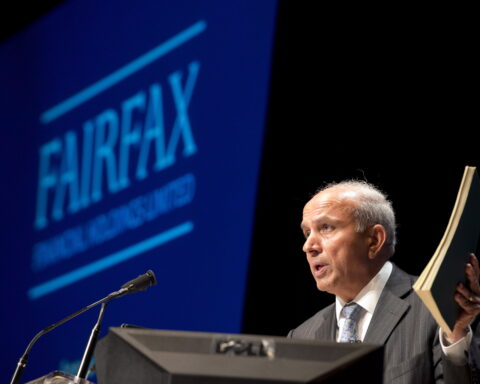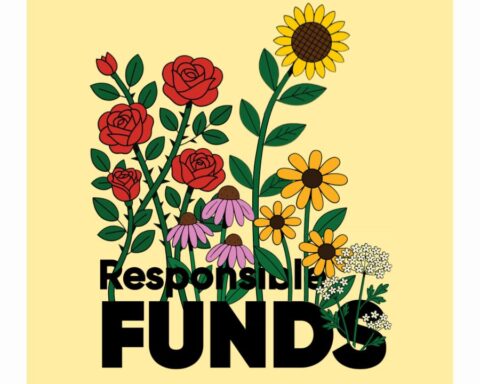When the Royal Bank of Canada recently disclosed it was dropping some of its most important climate pledges, it pointed the blame at Canada’s anti-greenwashing legislation. Now some investors are worried the move will set off a wave of retreat from sustainability commitments at the country‘s large banks.
“Investors and stakeholders are concerned about the ripple effects this action will have on the rest of the Canadian banks because we know they tend to move in lockstep with one another,” says Claire Trottier, a board member of the Trottier Family Foundation, in an email to Corporate Knights. Trottier says banks could create major uncertainty among their investors by dropping climate goals and disclosures. Any pullbacks must be “replaced by mechanisms that are more robust and actionable, rather than simply being dismantled,” she says.
The Quebec-based foundation recently mounted a campaign by investors to pressure RBC and other Canadian banks to maintain their climate commitments and disclosures in the face of a global retreat on sustainability issues. The campaign came a few months after all major Canadian and U.S. banks exited the Net-Zero Banking Alliance, the global climate network for banks.
In its annual sustainability report, RBC disclosed that it had “retired” a goal to mobilize $500 billion in sustainable finance by 2025, a target originally set in 2021. The bank also said it would not disclose its energy supply ratio (ESR), a metric that compares a bank’s low-carbon and fossil-fuel financing. It also said it is reviewing its financed emissions targets in the oil and gas, power and transportation sectors. The bank said anti-greenwashing changes to the federal Competition Act last year prompted these pullbacks.
Regulators have an important role to play making sure that claims are not outlandish. They have to be truthful. But I think that C-59 is being weaponized by companies so they don’t have to disclose as much.
– Dominique Barker, chief financial officer and head of sustainability, Lithium Royalty Corp
The anti-greenwashing amendments “limit the information we can share on certain sustainability disclosures and the progress we are making and have restricted our ability to publicly report on several metrics,” Jennifer Livingstone, RBC’s vice president for climate, said in a statement. “We are disappointed not to share these metrics externally but will continue to monitor and report them internally to measure our progress.” She said the key roadblock posed by the anti-greenwashing legislation is a “requirement to align to ‘internationally recognized methodologies’ where none exist.”
I4PC supports nixing $500-billion pledge
While the retreat on ESR reporting has produced widespread disappointment, RBC’s big-ticket pullback from sustainable finance has generated some support among climate-concerned investors. Investors for Paris Compliance (I4PC), a network for climate-focused investors, praised the bank for dropping its $500-billion sustainable finance commitment. “We see this as a positive step away from misleading environmental or climate claims,” I4PC wrote in a blog post.
The sustainable finance target “included many financial activities that were not quantitatively linked to achieving net-zero emissions – and in fact, in some cases, actually increased emissions,” says Kyra Bell-Pasht, I4PC’s director of research and policy. “We’re happy to see them step away from it and acknowledge that it’s not fit for purpose.”
I4PC supports three previous and more verifiable financing goals that the bank has committed to achieve by 2030: $1 billion for climate solutions, $35 billion for low-carbon energy and $15 billion for renewables. However, it’s not clear whether the bank intends to report progress on these goals.
Investors disappointed by ESR retreat
Last year, RBC and U.S. banks Citi and JPMorgan pledged to start reporting their ESRs, as a result of an agreement with the New York City pension system. This year, Scotiabank in Canada also pledged to report its ESR following investor pressure coordinated by the Shareholder Association for Research and Education (SHARE). Developed by the “new energy finance” division at Bloomberg (BloombergNEF), the ratio illustrates an institution’s level of low-carbon-energy financing compared with its fossil fuel financing. Bloomberg estimates that the ratio needs to be at least 4:1 low carbon to fossil fuel worldwide by 2030 to limit global warming to 1.5°C.
In an email statement following the bank’s recent disclosure, a spokesperson for New York City comptroller Brad Lander, who supervises the pension system, praised RBC for agreeing to employ the ESR metric internally. “However, we are disappointed that recent changes to Canada’s Competition Act led RBC to drop its sustainable finance targets and the disclosure of its energy supply ratio,” he added.
While the New York City pension system seems to accept RBC’s contention that the anti-greenwashing legislation restricts its ability to disclose targets and metrics, other investors are not so sure. A SHARE spokesperson said in an email it’s not clear whether the anti-greenwashing legislation applies to the ESR metric.
Related
As banks backslide on climate, Canadian shareholder groups demand reforms
Climate-action group SBTi holds firm on targets for companies
How climate risk disclosure became a battleground for the clean economy
I4PC went further, writing in its blog that RBC is putting “undue emphasis” on the anti-greenwashing legislation “as an excuse for not disclosing its energy supply ratio.” The post notes that BloombergNEF estimates RBC’s ESR at 0.36:1, far lower than the 4:1 ratio needed globally to avoid catastrophic climate change.
Bell-Pasht says it’s hard to understand why RBC contends that its ESR may be offside anti-greenwashing legislation (which requires that claims be consistent with global standards). She notes the ratio is based on advice from the Institute of International Finance, a global banking network. “We’re a bit confused,” she says. “RBC says its ESR methodology is based on international guidance. It sounds like it’s defensible and does align with the Competition Act.”
Anti-greenwashing bill ‘weaponized’
Dominique Barker, chief financial officer and head of sustainability for Lithium Royalty Corp., says that Bill C-59, the anti-greenwashing amendment passed last year, was introduced to ensure that corporate environmental claims are truthful. “Regulators have an important role to play making sure that claims are not outlandish,” Barker said in comments to a panel discussion May 5 in Toronto sponsored by the Queen’s University Institute for Sustainable Finance. “They have to be truthful. But I think that C-59 is being weaponized by companies so they don’t have to disclose as much.”
But Andy Chisholm, a member of the previous Liberal government’s sustainable finance advisory panel, told the forum that the heavy penalties set out in C-59 (as high as 3% of global revenues) and the right it gives to third parties to launch lawsuits are making lawyers very cautious in the climate disclosure advice they provide to corporate clients.
“You’ve got to get the disclosure regime going before you start creating all sorts of penalties,” Chisholm said. The federal advisory committee recommended a “safe haven” to provide companies with legal protection on climate disclosures, he added. “Instead of a safe haven, we put in place national legislation which says anybody has a right to contest something.” Chisholm, an RBC board member, said he was speaking for himself, not on behalf of the bank.
The federal government needs to provide better guidance to resolve the confusion over the anti-greenwashing legislation, Trottier said in her statement. “Some unintended consequences of Bill C-59 have introduced uncertainty and led to a pullback in corporate disclosures – ironically making it harder to assess the very risks the legislation is meant to uncover.”
Eugene Ellmen writes on sustainable business and finance. He is a former executive director of the Canadian Social Investment Organization (now the Responsible Investment Association).
The Weekly Roundup
Get all our stories in one place, every Wednesday at noon EST.







